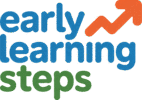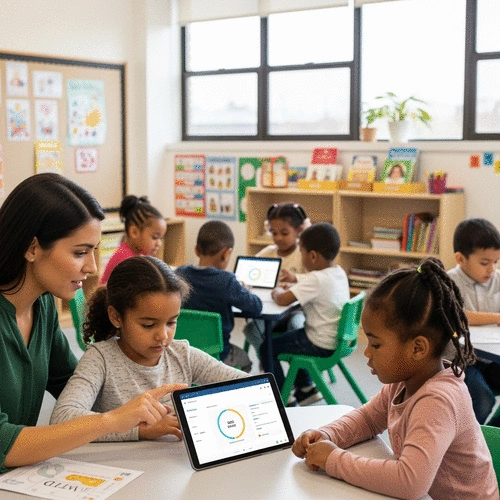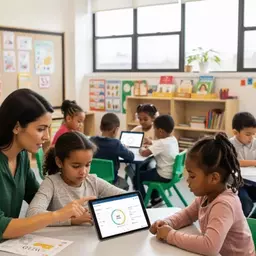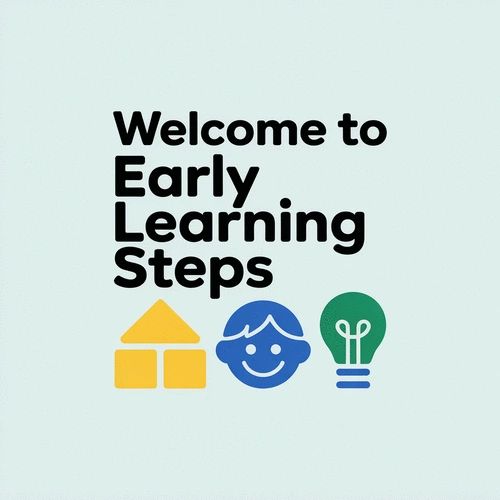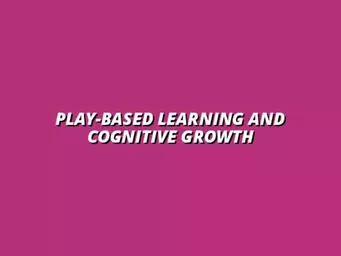As we embrace the transformative potential of real-time data in early education, we're not merely altering how we teach; we're redefining the entire learning experience. What if each child received an education tailored to their unique needs, inspired by data-driven insights? This is the future we're stepping into.
What You Will Learn
- The importance of real-time insights for monitoring student progress and adapting teaching strategies.
- Key stakeholders in the data-driven process: educators, administrators, parents, and community members.
- Best practices for gathering and analyzing early learning data to support educational strategies.
- How to implement real-time feedback mechanisms to enhance student engagement and performance.
- The role of data analytics in refining curriculum design and personalizing learning experiences.
- Strategies for fostering ongoing professional development among educators to improve data utilization.
- Ways to engage parents and the community in understanding and leveraging data insights for student growth.
The Data-Driven Journey in Early Learning
This diagram illustrates the cyclical process of leveraging real-time insights to enhance early learning, from identifying stakeholders to fostering continuous improvement. This comprehensive approach ensures that every aspect of a child's educational journey is supported by actionable data, leading to more effective and personalized learning outcomes. For further insights into supporting children's development, consider exploring parenting tips for emotional growth.
Key Stakeholders & Collaboration
Effective data utilization involves educators, administrators, parents, and community members working together to support learning outcomes.
Data Collection & Analysis
Gathering academic, behavioral, and feedback data, then analyzing it with effective tools to monitor student progress.
Real-Time Feedback & Strategy Adjustment
Implementing immediate feedback systems to help educators proactively adjust teaching strategies and refine curriculum.
Professional Development & Community Engagement
Fostering continuous learning for educators and involving parents and the community to champion personalized education.
Transforming Early Learning with Data-Driven Insights
In today's fast-paced world, leveraging real-time data in education has become a game-changer for personalizing early learning curricula. By harnessing these insights, we can address both educational outcomes and student engagement effectively. Imagine being able to tailor learning experiences that meet each child's unique needs! This approach not only enhances academic performance but also keeps young learners excited and involved in their education.
When we focus on personalizing early learning, we empower educators to make informed decisions. For instance, real-time data allows teachers to identify areas where a child may need additional support or enrichment. By doing so, we create an environment where every child can thrive—bringing to life the mission of Early Learning Steps to nurture confident, curious learners!

Understanding the Importance of Real-Time Insights in Education
Real-time insights are invaluable in the realm of early education. They help us to:
- Monitor student progress continually, ensuring no child falls behind.
- Adapt teaching strategies based on individual learning styles.
- Engage families by sharing data that showcases their child's growth and development.
These insights enable educators to pivot quickly, making adjustments that can lead to improved outcomes. Just think about how you can support your child's learning journey more effectively with real-time feedback! Additionally, understanding how to teach emotional intelligence in classrooms can further enhance these outcomes.
Identifying Key Stakeholders in the Data-Driven Process
To effectively utilize data, we must recognize the key stakeholders involved in this process. They include:
- Educators: who interpret data to tailor their teaching methods.
- Administrators: who facilitate the implementation of data systems.
- Parents: who play a crucial role in reinforcing learning at home.
- Community members: who support local educational initiatives and provide resources.
Collaboration and communication among these groups are essential. When everyone is on the same page, we create a robust support system that fosters a thriving educational environment!
Navigating the Data Journey: From Collection to Application
Gathering and Analyzing Early Learning Data
As we embark on our data journey, it's important to establish best practices for data collection. Here are some types of data you should consider gathering:
- Academic assessments that track learning progress.
- Behavioral observations to understand social-emotional development.
- Feedback from parents and educators regarding learning experiences.
Utilizing effective tools for analysis is crucial to ensuring the accuracy of this data. With accurate monitoring, we can confidently support student progress and make necessary adjustments to our strategies.
Implementing Real-Time Feedback Mechanisms
Real-time feedback systems can transform the educational landscape by:
- Providing immediate insights into student performance.
- Helping educators adjust their teaching strategies proactively.
- Facilitating timely communication between teachers and parents.
Imagine how much more engaged learners can be when they receive instant feedback! This not only boosts their confidence but also encourages a love for learning.
Leveraging Data Analytics for Enhanced Learning Outcomes
Data analytics can significantly inform educational strategies by:
- Refining curriculum design to better suit student needs.
- Enhancing student engagement through tailored learning experiences.
- Identifying trends that can guide future teaching methods.
At Early Learning Steps, we believe that utilizing data analytics is key to shaping a brighter future for our children. By harnessing these insights, we can ensure that our young learners have access to the best possible educational experiences!
Interactive Poll: Your Thoughts Matter!
As we explore the role of data in early learning, we want to hear from you! How do you feel about the use of real-time data in personalizing education for young learners?
Continuing the Journey: Next Steps in Data Utilization
As we delve deeper into the world of data-driven education, it's essential to prioritize ongoing professional development for educators. This continuous learning not only enhances skills in data interpretation but also promotes a culture of improvement that can significantly impact our young learners. By fostering an environment where teachers feel comfortable exploring new tools and strategies, we're setting the stage for innovative teaching practices that can adapt to the diverse needs of every child.
Fostering Ongoing Professional Development
Professional development should be a dynamic and engaging process. Here are some strategies to consider:
- Workshops and Training Sessions: Regularly schedule hands-on workshops that focus on data analysis tools and their applications in early childhood education.
- Peer Collaboration: Encourage educators to share insights and experiences regarding data use in their classrooms. Collaboration fosters a supportive learning environment!
- Online Resources and Courses: Provide access to online courses that delve into data analytics focused on early education, allowing educators to learn at their own pace.
- Mentorship Programs: Pair experienced educators with those new to data-driven teaching, facilitating knowledge transfer and confidence building.
By implementing these strategies, we can empower educators to embrace data as a tool for enhancing educational experiences, ultimately benefiting the students at Early Learning Steps. This approach also aligns well with strategies for integrating UDL in early childhood.

Engaging Parents and the Community in Data Insights
It's crucial to involve parents and the community in the data conversation, ensuring they understand the significance of real-time insights. Here’s how to effectively engage them:
- Informative Workshops: Host sessions for parents that explain how data is used to personalize learning and improve outcomes.
- Regular Updates: Use newsletters or digital platforms to share insights on student progress and explain how data informs teaching practices.
- Feedback Opportunities: Create avenues for parents to provide feedback on their child's learning experience, which can enhance the overall data-driven approach.
- Collaborative Events: Organize community events that celebrate student achievements and show the impact of data-driven education.
By bringing parents and the community into the fold, we can create a united front that champions personalized learning and nurtures children’s growth.
Embracing Change: The Future of Personalized Early Learning
The potential of data-driven personalization in early education is immense. As we continue to harness these insights, the long-term benefits for our students and educational community become clear. Imagine a learning environment where each child's unique needs are met through tailored educational experiences — that’s the future we are striving for!
Innovative Pedagogical Approaches in Data-Driven Curriculum
We are witnessing exciting trends in pedagogy that draw upon data-driven insights. Consider these emerging approaches:
- Flipped Classrooms: Students engage with new material at home and apply knowledge in class, allowing teachers to tailor support based on data insights.
- Project-Based Learning: Data helps educators design projects that align with student interests and abilities, fostering engagement and collaboration.
- Adaptive Learning Technologies: Utilize tech tools that adapt in real-time based on student performance data, enhancing personalized learning pathways.
By embracing these innovative approaches, we are not just preparing our children for today, but equipping them for a successful tomorrow!
Call to Action: Taking the First Step Towards Data-Driven Curriculum
Now is the time for educators and administrators to take action! Start integrating real-time insights into your practices by:
- Identifying specific data tools that align with your curriculum goals.
- Setting clear objectives for how data will enhance your teaching methods.
- Creating a timeline for gradual integration, allowing for ongoing reflection and adjustment.
- Reaching out to the Early Learning Steps community for resources and support as you embark on this journey.
Let’s take that first step together towards a more personalized and data-informed educational experience for all our children! For more strategies on enhancing early learning, delve into effective play strategies for learning.
Frequently Asked Questions
What is the main goal of leveraging real-time data in early education?
The main goal is to redefine the learning experience by tailoring education to each child's unique needs, inspired by data-driven insights, and fostering confident, curious learners.
Who are the key stakeholders involved in the data-driven process for early learning?
Key stakeholders include educators, administrators, parents, and community members. Their collaboration and communication are essential for a robust support system.
What types of data should be gathered for early learning?
Types of data to consider include academic assessments to track learning progress, behavioral observations for social-emotional development, and feedback from parents and educators regarding learning experiences.
How do real-time feedback mechanisms benefit early learning?
Real-time feedback systems provide immediate insights into student performance, help educators proactively adjust teaching strategies, and facilitate timely communication between teachers and parents, boosting confidence and engagement.
Why is ongoing professional development important for educators in data utilization?
Ongoing professional development enhances educators' skills in data interpretation, promotes a culture of continuous improvement, and helps them explore new tools and strategies to adapt to diverse student needs, ultimately benefiting young learners.
Recap of Key Points
Here is a quick recap of the important points discussed in the article:
- Utilize real-time data to personalize early learning experiences for each child.
- Engage key stakeholders, including educators, parents, and the community, to create a supportive educational environment.
- Implement effective data collection methods to monitor student progress and adapt teaching strategies accordingly.
- Incorporate real-time feedback mechanisms to enhance student engagement and learning outcomes.
- Foster ongoing professional development for educators to effectively use data-driven insights in their teaching.
- Engage parents and the community by sharing progress data and celebrating student achievements.
- Embrace innovative pedagogical approaches that leverage data to create tailored learning experiences.
